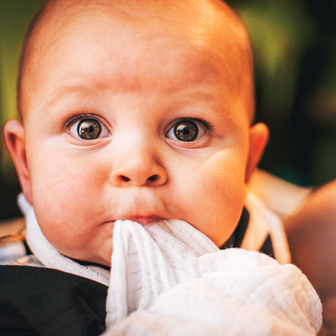Having to go through teething with your precious child is not the most enjoyable milestone. Teething is the worst because otherwise perfectly happy babies seem to change personalities overnight as they become more irritable. It may seem as though there is nothing you can do to help them. They are cranky, tired, and just plain upset during teething.
Every child’s teething period is different, which is why there is no set duration for when teeth come in. Depending on the baby’s development, he or she may get his or her teeth early or a bit later.
In general, the first tooth usually comes in between four and seven months of age, but it can happen a little bit earlier or a little bit later than that.
Typically, the bottom two teeth appear first followed by the top two little teeth, but there are no hard and fast rules.
After a baby gets their first tooth, it may seem like they’re constantly teething, as they’ll develop symptoms on and off.
Is it Normal for a Baby to Drool Excessively?
Drooling is one of the most common signs of teething, but it is also a normal part of child development, most babies begin to drool a lot and eat everything that comes to their mouth at around three months old or so, and when this occurs, many parents simply assume that the baby is teething.
However, even though it may seem that baby has started getting teeth, it is important to keep in mind that a baby at 3 months of age is probably exploring the world by putting everything in his mouth without necessarily doing so because he is teething
Teething Symptoms
Diarrhea
Diarrhea is often reported by parents when their children are teething. Teething is therefore frequently associated with diarrhea. Nonetheless, according to Healthy Children.org teething does not cause diarrhea.
The link between teething and diarrhea is not proven. Despite the fact that diarrhea is often associated with it, no research backs this up.
Teething and diarrhea may occur at the same time by chance. It is not uncommon for parents to dismiss symptoms associated with other illnesses when their baby is teething.
When this happens, it can delay treatment for underlying illnesses, so if you notice that your baby is having unusual symptoms, and they’re persisting or getting worse, call your doctor, and they’ll be able to determine if any action needs to be taken.
A Low-Grade Fever
Temperatures higher than 100.4°F or 38°C should be watched for. Such temperatures are often a sign of another infection or illness. Speak to your pediatrician if your baby is running a fever.
When babies are starting to get their teeth, many parents report that their babies get fevers. Literature, however, indicates that drooling and a desire to chew everything are the most common symptoms. When your baby has a fever, it’s always a good idea to get them checked out.
Your doctor will be able to help you determine whether a fever is a symptom of another illness. Fever in children should not be underestimated, as this could be a sign of an ear infection or something even more serious.
Mild Irritability
An early sign of teething is fussiness and irritability. Babies may naturally adjust to discomfort while growing their teeth. Parents, however, can intervene to soothe their irritable babies.
It may cause frustration for babies to feel strange pressure against their gums due to their teeth coming in. Providing a soothing treatment for discomfort can reduce irritability. The irritability may last for several hours or even several weeks at a time.
Sleep Disruptions
You can expect fussiness if your baby is lacking sleep due to sore gums.
Sleep disruptions may go on for a while especially if there are teeth trying to come through that you can’t really see yet.
Changes in sleep patterns can also help you identify if your child is waking up because of teething.
Discomfort and pain would cause your child to wake up at unusual times. Consider your child’s normal sleep patterns and compare them with what’s going on now. Have you noticed that your child usually sleeps for three hours at a stretch, but is suddenly waking every hour or so? If this is the case, then perhaps baby having teeth come in is disrupting their sleep.
It\’s important to note, however, that if your child is used to being rocked or nursed to sleep, and they wake up at predictable times, you may be blaming teething when its’s really their sleep association.
When is Teething Pain the Worst?
Symptoms associated with teething usually peak four days before a tooth appears and last for three days afterward. Therefore, if your baby still seems miserable after a few days with the tooth through the gum, there might be something else going on
If your baby is teething, you will notice a swollen red area on the gum where the tooth is trying to emerge.
There are times when the first tooth breaks through and is visible, while other times the baby shows signs of teething but no tooth will come out and the process may seem continuous for a few weeks
Help Baby While Teething

Talk with the doctor about which over-the-counter pain relievers are appropriate for your baby\’s age and weight; they will be able to inform you of what dosage and schedule is appropriate.
Other things to Try:
- Wash your hands thoroughly and trim your nails, then gently rub the areas that look red and swollen, and this can provide your baby with a lot of pain relief. This is another reason why they put everything in their mouth and want to gnaw everything.
- Offer teething rings (make sure they aren’t filled with liquid).
- Offer a cooled wash cloth (with supervision)
RELATED: 7 Signs Your Baby is Teething: 7 Ways to Soothe the Gums
Things to Avoid
- Teething rings that are filled with liquid
- Avoid teething tablets
- Teething medicines containing belladonna or benzocaine
- Amber necklaces that claim to relieve teething symptoms as they may strangulate the baby’s neck.
Caring for Baby’s Teeth
Once the first few teeth appear, you can begin brushing them with a soft-bristle toothbrush. Fluoride toothpaste may be used.
Before you put your baby to bed at night you should avoid giving her a bottle or juice because it can lead to tooth decay. Also, make your baby’s first dental appointment around their first birthday.
A dentist’s visit provides you with an opportunity to ask questions about concerns or observations you have made, and it also allows them to educate you about proper oral hygiene for your baby before they might have to undergo a procedure or undergo care for it in the future.
Final Thought
How long does teething last? When do babies start teething? There is no universal answer to the question of when babies start teething, and how long it takes varies greatly depending on your child\’s growth and development.
Typically, a child grows all 22 teeth within two years. About 2 1/2 to 3 years old, the majority of kids have all 22 teeth.
It\’s more likely that your child’s teething symptoms will appear when every new set of teeth is about to erupt, and between two weeks and a week before they have their first bottom front teeth.




1 thought on “How Long Does Teething Last In Babies?”
Pingback: How to Manage the 2-Year-Old Sleep Regression - Wellandgood Family